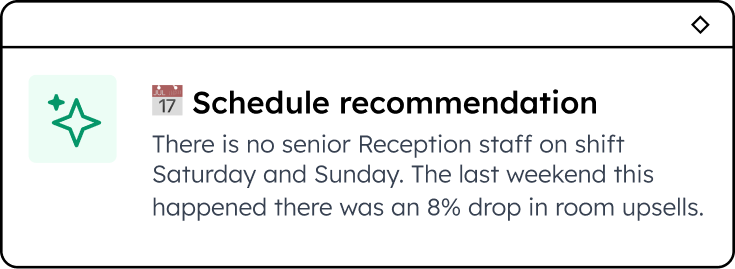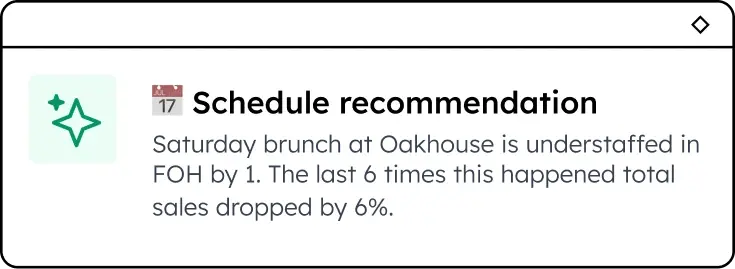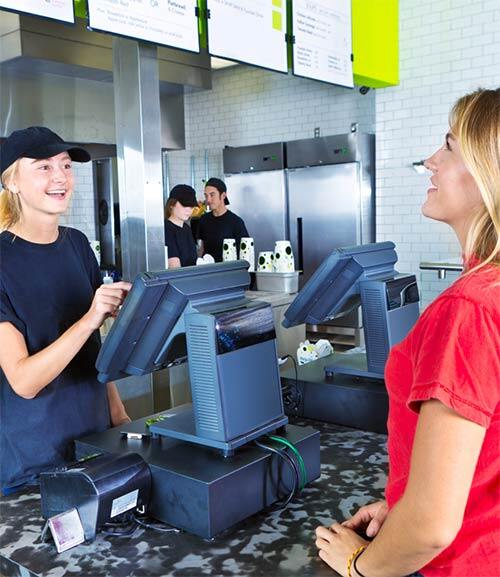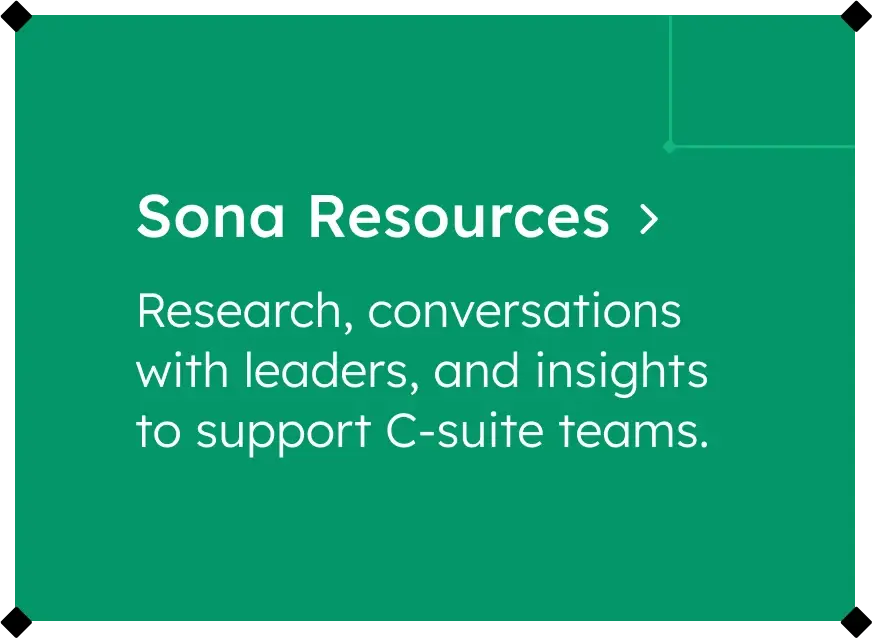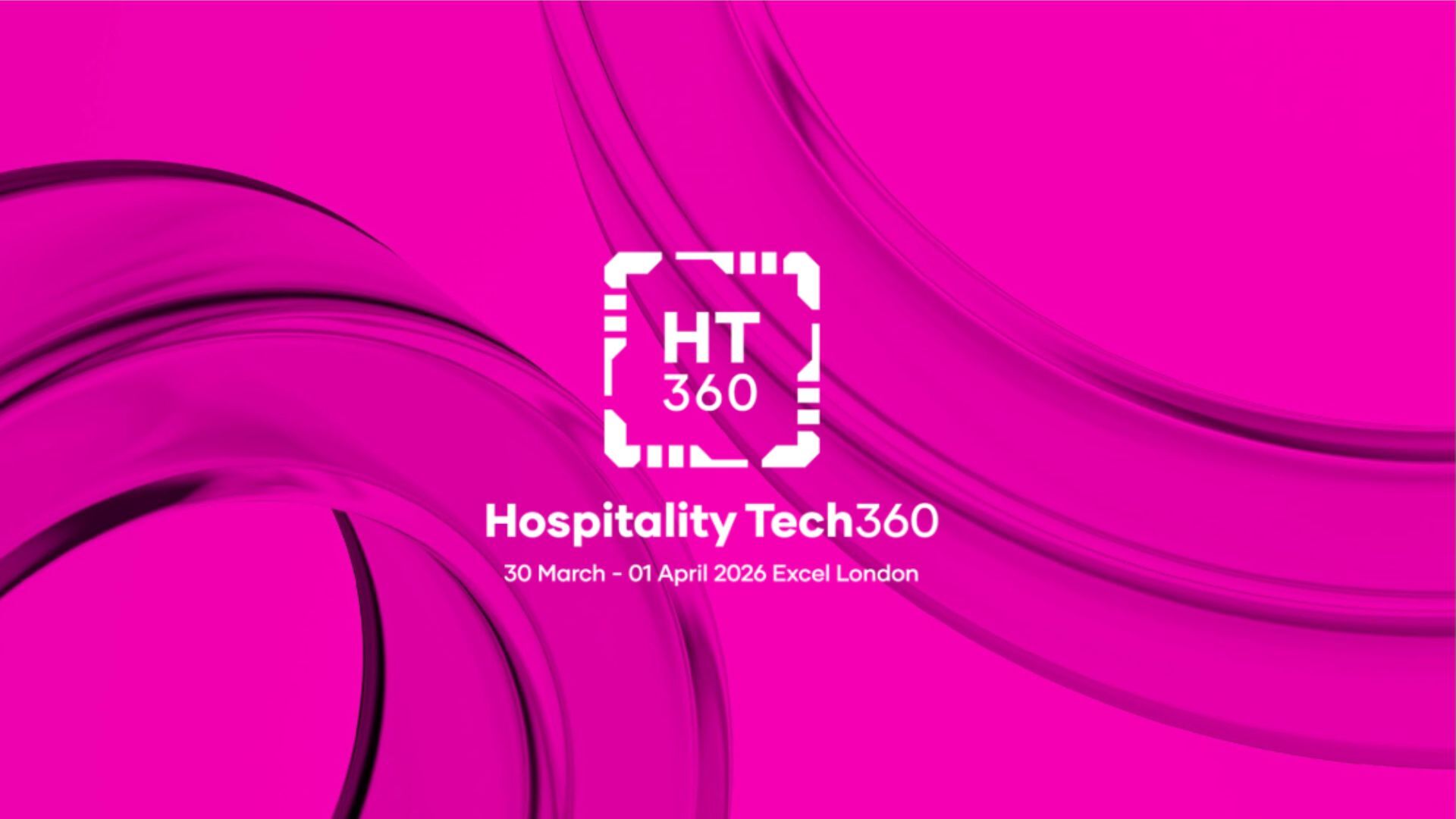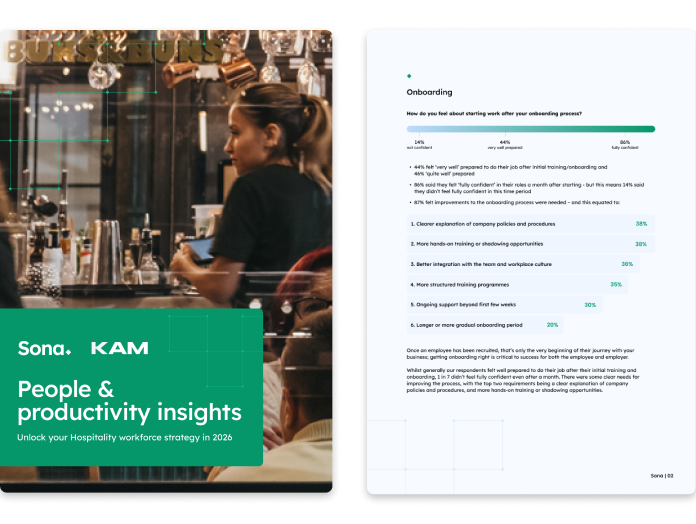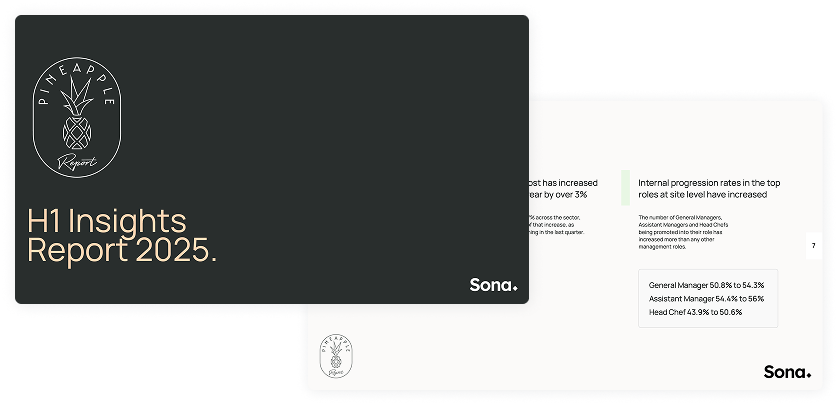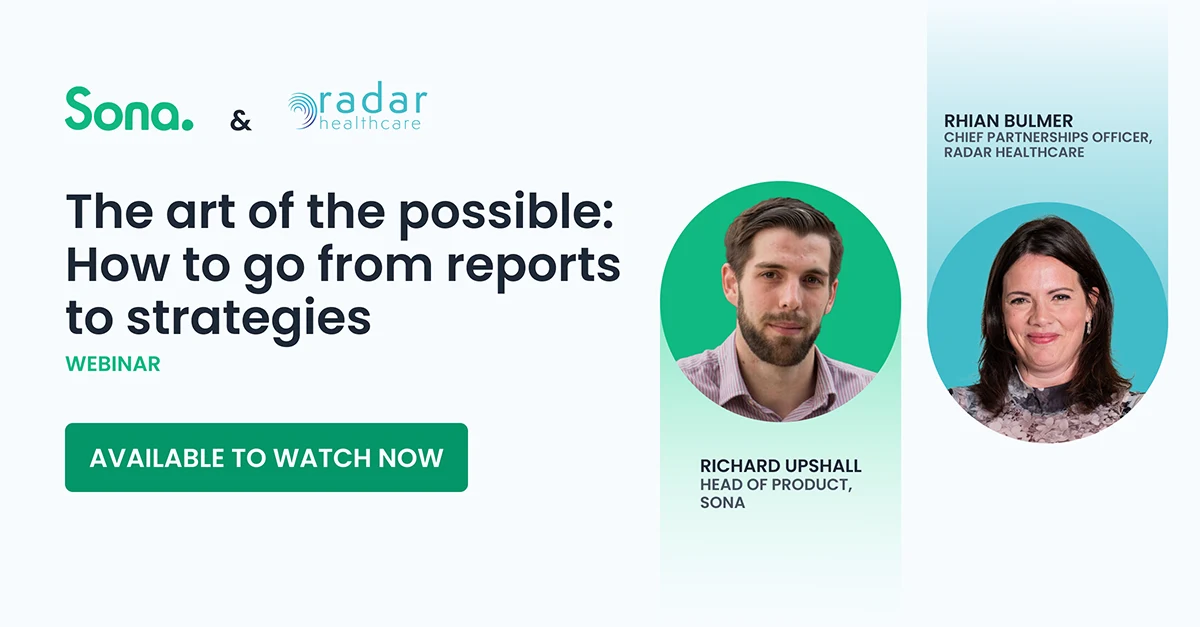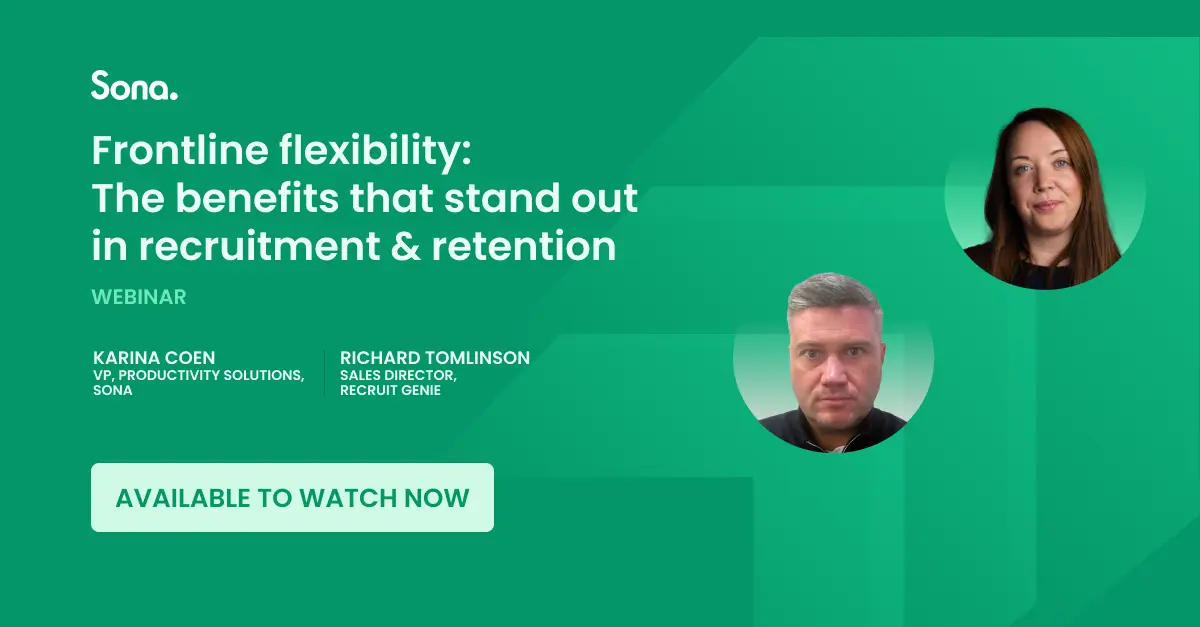Sona Webinar Recap | Closing the gap: Strategies for workforce retention in Hospitality
The hospitality industry has faced many challenges in recent years. The current cost-of-living crisis, coupled with Brexit and the aftermath of the pandemic, have all impacted venues and providers, but throughout they’ve managed to overcome these thanks to a dedicated and passionate workforce. Paul Watson, VP of Customer Success at Sona, sat down with Hannah Swarbrick, HR manager at East Coast Concept, to discuss the future of this workforce and how to improve its management strategies.
6 minute read
Here are the key takeaways from our latest webinar, Closing the Gap: Strategies for Workforce Retention in Hospitality, with HR experts, Hannah Swarbrick and Paul Watson.
Closing the Gap webinar: running order
01:32 | Introduction of speaker Hannah Swarbrick
04:33 | Is hospitality a stopgap career for people?
09:15| Showcasing hospitality as a viable option to people before university
10:20 | The Pandemic and Brexit’s impact on the sector’s workforce
17:40 | The industry focus is moving to people management more than profit
20:25 | Is considering soft skills development superfluous a thing of the past?
22:00 | How important is the employee experience?
37:40 | Social media’s impact on entrants' expectations for speed of progression
39:59 | Understanding workers’ neurodiversity and learning modes when planning training

Meet the panel
Paul Watson, Vice President of Customer Success at Sona
Paul began his professional career at Orange, where he acquired a deep understanding of brand values, customer satisfaction and employee care. Since then, Paul has been reshaping hospitality's back-office solutions for 16 years, providing processes, values, teams, and product launches.
Paul started working at Sona, an operating system for frontline teams, in 2022. Adept at addressing real issues in the hospitality industry, his experience and commitment to change make him an inspiring voice to follow.
Hannah Swarbrick, HR manager at East Coast Concept
Hannah is a fervent culture cultivator and change advocate, dedicated to crafting meaningful employee experiences. She is an Associate Chartered Institute of Personnel and Development (CIPD) qualified professional in HR Management and holds a certification as a Mental Health First Aider through MHFA England.
Helping others realise their potential in the hospitality industry is something Hannah is very passionate about. In March 2023, Hannah became a Hospitality Mentor for Otelo. The platform helps support mentees to navigate and carve out their own career path with confidence, whilst recognising and harnessing their unique skills.
3 Key takeaways from this webinar on the culture of recognition
1) Hospitality doesn't have a skills shortage: it has a talent acquisition problem
A key takeaway from the webinar, which both speakers agreed on, was that there actually isn’t a skill shortage in the sector—despite the government’s soon-to-launch hospitality ‘boot camps’ suggesting otherwise. In fact, there’s a huge lack of visibility when it comes to career possibilities, meaning the sector is failing to attract the talent it really needs.
There’s a common perception of jobs in hospitality as simply a stopgap for students or job seekers. Hannah points out that this misconception only highlights the general public’s lack of knowledge of career progression in the hospitality industry.
Working in the hospitality sector is not just a part-time job. In reality, and Hannah’s trajectory is a testament to this, there are so many opportunities. From operations to HR, there’s something for everyone, and every skill set, in the hospitality industry.
Hannah points out:
“If people in schools or colleges could be shown the possibilities in hospitality, from career progression to even salary potential, maybe there would be more talent going into the sector.”
2) Hiring and retaining Gen Z employees: employee experience & reflective recruitment
With the challenges ahead, HR managers need to be commercially minded to reduce staff turnover rates. Both our speakers agreed that employee experience is key to achieving that goal.
Hannah recommended to employers to "be obsessed about the employee experience and understand everything it encompasses."
Hannah mentions that HR managers need to understand:
- What does employee experience mean?
- What are the employee touch points within your organisation?
- How can they provide a more positive experience that makes a real day-to-day impact?
Training programmes, regular check-ins, and personal and professional development opportunities are great places to start when looking to boost employee satisfaction. However, it’s important to not just rely on market standards, but to find out what makes your business unique and focus on your USP (e.g., comprehensive employee benefits package, employee recognition , or flexible working options) to retain top talents.
Enticing Gen Z about hospitality as a career option—made more difficult by the fact that they had minimal exposure to the industry during the pandemic years—is another challenge for HR managers. Hanna thinks that being more agile may be the solution here. She explains that the younger generation craves higher tech involvement, transparent communication, and a sense of being part of the solution.
Being more reflective and empathetic about recruitment is key to hiring and retaining this emerging employee demographicPaul underscores the importance of crafting interviews that gauge talent based on competence, personality, and soft skills, saying:
“Choose candidates whose personal values align with your business.”
3) The aftermath of the pandemic, Brexit, and social media: the ever-evolving hospitality industry
Paul points out that over half a million workers have left the UK since Brexit and the pandemic. The labour exodus hit the hospitality industry hard, with businesses losing many long-tenured employees.
The massive workforce shortage forced employees, especially recruiters, to question the way the industry operated pre-pandemic.
Hannah explains that in post-lockdown times, the focus was on retaining employees. However, the non-European employee shortage made hiring new talent even tougher.
As a result, HRs had to pivot, targeting a whole new audience—encouraging English nationals and the younger generation (the biggest workforce demographic in the UK) to join hospitality. This shift is now shaping the future of the hospitality industry in the UK.
In addition to a depleted workforce, social media is making things even more challenging. Most Gen Z workers expect lightning progression within the role—much like their influencer role models.
To tackle these changes, both speakers agree that younger workforce can be enticed by:
- Clear career trajectories: a well-defined career direction that enables them to see their progression in hospitality
- Dynamic L&D opportunities: both online and offline learning channels and mentoring opportunities to encourage consistent and holistic growth
- Remote work and flexibility: introducing flexible work arrangements, including hybrid work options, to accommodate changing preferences and attract a broader range of talent
Hannah also proposed job shadowing across different roles (from bartenders to managers) as a practical solution. Along with incentivising the younger population to join in, it can help them visualise their long-term career options within the industry by exposing them to a team or role they hadn’t previously considered.
The future of hospitality recruitment, retention, and employee engagement
The hospitality industry is evolving to fit the needs of the new-age workforce. Moving forward, employee wellbeing and retention will be at the core of every successful business.
Both Hanna and Paul agree that while the government boot camps can help bring new talent to the industry, it’s ultimately up to HR managers to retain this workforce.
However, if you’re not sure how to achieve this goal for your businesses, we’re right here for you. We can start improving your recruitment and retention with the workforce success tools of today and the future.
Enjoyed this article? Let's stay in touch 👋
If you liked this article, why not subscribe to our newsletter to get the latest news and views delivered straight to your inbox?

